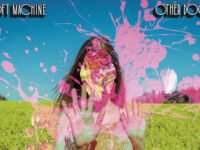You can’t keep a good band down. Former members of the British jazz-by-way-of-Canterbury band Soft Machine reconvened in numerous configurations following their dissolution in the early ’80s: Soft Heap/Soft Head (which actually formed as an offshoot in 1978, while Soft Machine was still in existence), Soft Ware, and perhaps most promisingly, Soft Works in 2002. That combination of Allan Holdsworth, Elton Dean, Hugh Hopper and John Marshall recorded just one disc, Abracadabra. Other short-lived spinoffs included Soft Mountain and Soft Bounds.
Soft Works eventually morphed into a continuing aggregation with guitarist John Etheridge replacing Holdsworth, just as he had with the original Soft Machine in the mid-’70s. The newly minted Soft Machine Legacy crafted two fine live sessions and a studio disc before before saxman Elton Dean died. Theo Travis replaced Dean, and when Hopper passed away, Roy Babbington stepped in for him (again, just as happened decades ago in Soft Machine proper).
The group has toured steadily since, and all told recorded six albums before dropping the Legacy portion of the name for 2018’s Hidden Details. Their newest recording, Live at the Baked Potato (MoonJune Records) was recorded at the venerable LA jazz club and includes tunes harkening back to Soft Machine’s mid-’70s era as well as more recent selections.
“Out-Bloody-Intro” opens the show, with Travis on electric piano. When the rest of the band comes in, he switches to saxophone for the Soft Machine’s classic “Out-Bloody-Rageous.” Other familiar fare appears here as well, including “Hazard Profile, Part 1,” “The Tale of Taliesin” and “The Man Who Waved at Trains.” Marshall’s drum solo on “Sideburn” leads into “Hazard Profile,” offering Travis space for long, languorous lines before Etheridge’s pyrotechnics.
“Kings and Queens,” with Travis on (sometimes looped) flute, offers a respite, before they rev things up again on “Taliesin.” “Trains” finds Etheridge and Travis on flute trading lines and playing in unison. “Broken Hill” showcases Etheridge’s fluid guitar, with Marshall’s dry snare and crisp cymbals setting it off.
There may be some who decry Soft Machine adopting the old name when forebears such as Holdsworth, Hopper, Dean, Mike Ratledge, Karl Jenkins and others are no longer a part of the lineup. But a glance at the band’s history shows a constantly shifting lineup; no two albums featured the same personnel. And with three former members, Soft Machine has as much right to the name as do the current lineups of Yes, King Crimson or any other band that has stood the test of time.
More pointedly, does this edition of Soft Machine stand up to what went before? While their original psychedelic leanings and rock overtones are no longer a part of the approach, in truth those were left behind about the time Robert Wyatt decamped to Matching Mole in the early ’70s.
So, a more apt comparison is to the mid-to-late ’70s versions, and in that regard, Live at the Baked Potato shows a Soft Machine that is alive and well in Los Angeles.
- Jon Anderson, Reza Khan, CSNY + Others: Ross Boissoneau’s Best of 2024 - December 30, 2024
- Tower of Power, Jennifer Hudson, Ben Folds + Others: 2024’s Seasonal Sounds - November 25, 2024
- Dave Bainbridge of Downes Braide Association: The Albums That Shaped My Career - October 9, 2024



